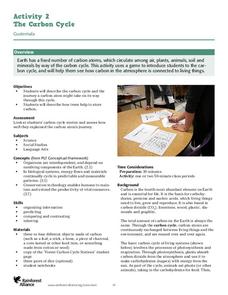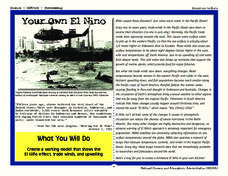EngageNY
Unknown Angles
How do you solve an equation like trigonometry? Learners apply their understanding of trigonometric ratios to find unknown angles in right triangles. They learn the meaning of arcsine, arccosine, and arctangent. Problems include basic...
Latin America Network Information Center
Urbanization
Brazil's population has been changing dramatically in the last century. Study the causes of Brazilian urbanization, including industrialization and and migration, and the implications for the country of the populations'...
National Wildlife Federation
What's Your Habitat?
How are third graders like rabbits? They both live in habitats and require food, water, and shelter to survive! An educational science instructional activity encourages your learners to think about their own habitats and survival needs,...
Pearson
Adjective Clauses
Encourage the knights and princesses in your class to practice adjective clauses and relative pronouns in a fairy tale-themed presentation! Several slides review the structure of sentences with adjective clauses before prompting your...
Rainforest Alliance
Get in Touch with Nature
Take a trip to the Colombian rainforest through the sense of touch. Here, class members discover what's inside a mystery box: wood, cinnamon, Brazil nuts, a banana, and orange. Then, the class takes a trip outside for a tree rubbing...
Rainforest Alliance
Knowing the Essential Elements of a Habitat
To gain insight into the many different types of habitats, individuals must first get to know their own. Here, scholars explore their school environment, draw a map, compare and contrast their surroundings to larger ones. They then write...
Michigan State University
Friend or Foe?
What one person thinks is a pest may not be a pest to someone else. Here, scholars examine the characteristics of living things and pests through grand conversation and a variety of activities. Class members play a game of pest or not a...
Rainforest Alliance
The Carbon Cycle
Scholars learn about the carbon cycle, play a carbon cycle game, and then write a story based on their role as a carbon atom during the game. After the writings, pupils analyze the carbon cycle by leading a class discussion on the material.
Global Oneness Project
Ancient and Modern Worlds
The old aphorism, "The road to Hell is paved with good intentions," might well serve as the title for a resource that asks viewers to consider the plight of the people of the Gamo Highlands, an area in southwestern Ethiopia. These...
Association of Fish and Wildlife Agencies
Schoolyard Biodiversity Investigation Educator Guide
In 1980, in the tropical rainforests of Panama, scientists discovered 1,200 species of beetles living in and around just 19 trees, with most of the species new to science—that's biodiversity! In the activity, learners work in teams to...
NOAA
Ocean Primary Production
A cold seep is an area on the ocean floor where hydrocarbons leak from the earth, creating entire unique biomes. Learners explore cold seeps, photosynthesis in the ocean, and its limitations due to loss of sunlight. They further explore...
National Park Service
It Was a Very Good Year
Waterton-Glacier International Peace Park includes whitebark pines that are over 1,200 years old, meaning they have been there since before medieval times. The second lesson of five details how to read tree rings for climate change and...
Curated OER
An Exploration of Cradle-to-Cradle Design Thinking
Introduce cradle-to-cradle design thinking. Scholars first discuss the importance of natural laws and rights. They then use a variety of online and print resources to research eco-efficiency and cradle-to-cradle design.
Chicago Botanic Garden
Greenhouse Gas Emissions — Natural and Human Causes
What impact do humans have on greenhouse gas emissions? What are the natural causes of these gasses? Thanks to the carbon cycle, carbon dioxide eats away at the earth's atmosphere with the intensified help of humans. Young scientists...
Chicago Botanic Garden
Impacts of Climate Change
Scholars become experts on the eight major impacts of climate change through a jigsaw and grand conversation. They then research and present what they learned about effects specific to their region.
Chicago Botanic Garden
Leaf Litter Ecology Lab
Some organisms spend their entire lives in leaf litter. The third in a series of six is a great lesson exploring the community of leaf litter. Groups gather and then spread leaf litter over white paper and remove leaves/twigs while...
Chicago Botanic Garden
Introducing Ecosystem Services
Purifying air and water, providing soil in which to grow crops, and moving water through its natural cycle are all services an ecosystem provides that benefit humans. Lesson four in a series lets learners explore and discuss the value of...
Chicago Botanic Garden
Climate Change Impacts on Ecosystem Services
The fourth activity in a series of five has classes participate in a jigsaw to learn about global impacts of climate change and then share their new information with a home group. Groups then research impacts of climate change (droughts,...
Chicago Botanic Garden
Introducing Ecosystem Services
Ecosystems provide many things humans not only use but also need in order to survive. The last activity in the series of seven introduces scholars to the idea of ecosystem services, that ecosystems provide humans with many things we...
Reed Novel Studies
Hatchet
A brief introductory presentation illustrates many images from Gary Paulsen's Hatchet. From berries to black bears, young readers take a quick trip through Alaska during a class reading unit.
English Worksheets Land
The Donkey, the Fox and the Lion
Have learners read about a lion that lures a foolish fox into a trap and gets himself and his donkey friend eaten. After reading, pupils answer three questions and determine what the lesson of the story is.
Harper Collins
Let the Wild Rumpus Start!
Accompany a reading of the story, Where the Wild Things Are by Maurice Sendak, with an activity booklet featuring five worksheets created to continue to the learning experience. Scholars solve a maze, draw a picture, search for Max,...
NOAA
Your Own El Nino
Scholars make a model to discover how the force of trade winds over the Pacific Ocean creates an El Niño. Super scientists observe how the severe weather affects life in water and on land.
Bulgarian Creative Writing Competition
Creative Writing Prompts For Every Season and Month
Winter, spring, summer, and fall! Every season is covered in a 14-page list of writing prompts. Included are story starters, reflection questions, poetry topics, and more.
Other popular searches
- Forestry
- Rain Forests
- Deciduous Forest Food Chains
- Forest Fires
- Forest Animals
- Boreal Forest Food Web
- Forestry Coloring Pages
- Deciduous Forests Map
- Kelp Forest
- Temperate Forest Ecosystem
- Forest Ecosystem
- Forest Layers

























